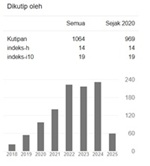ANALISIS KEMAMPUAN DISPOSISI MATEMATIS PADA PEMBELAJARAN MATEMATIKA SMP DENGAN MENGGUNAKAN METODE ANALISIS FAKTOR
Abstract
Penelitian ini bertujuan untuk mengetahui ada tidaknya pengaruh disposisi matematis terhadap hasil belajar siswa dan apabila ada, berapa eratnya pengaruh serta berarti atau tidaknya pengaruh itu. Jenis penelitian yang digunakan dalam penelitian ini adalah penelitian kuantitatif. Instrumen yang digunakan dalam penelitian ini yaitu isntrumen angket. Dari hasil penelitian diketahui terdapat 3 faktor yakni faktor 1, faktor 2, dan faktor 3. Faktor yang lebih dominan dari semua faktor yaitu faktor 1 sebesar 31,914%, faktor 2 sebesar 16,175%, faktor 3 sebesar 59,564%, dan total keseluruhan faktor sebesar 91,379%. Maka didapat faktor yang lebih dominan dalam proses belajar matematika di SMPN 2 Jember yaitu faktor 1, yang memiliki variansi paling besar dibandingkan faktor yang lainnya.
This research aims to determine whether there is an influence of mathematical disposition on student learning outcomes and, if there is, how strong the influence is and whether or not the influence is significant. The type of research used in this research is quantitative research. The instrument used in this research is a questionnaire instrument. From the research results, it is known that there are 3 factors, namely factor 1, factor 2, and factor 3. The factor that is more dominant than all factors is factor 1 at 31.914%, factor 2 at 16.175%, factor 3 at 59.564%, and the total factor is 91.379 %. So it was found that the more dominant factor in the mathematics learning process at SMPN 2 Jember was factor 1, which had the greatest variance compared to the other factors.
Keywords
Full Text:
PDFReferences
Blackwell, L. S., Trzesniewski, K. H., & Dweck, C. S. (2007). Implicit Theories of Intelligence Predict Achievement Across an Adolescent Transition: A Longitudinal Study and an Intervention. Child Development, 78(1), 246-263.
Boaler, J. (2002). Experiencing School Mathematics: Traditional and Reform Approaches to Teaching and Their Impact on Student Learning. Journal for Research in Mathematics Education, 33(1), 43-63.
Damayani, A.T dan Cintang, Nyai. 2018. Pembelajaran Bilangan Sekolah Dasar. Semarang: Universitas PGRI Semarang.
Deci, E. L., & Ryan, R. M. (1985). Intrinsic Motivation and Self-Determination in Human Behavior. New York: Springer.
Dweck, C. S. (2006). Mindset: The New Psychology of Success. New York: Random House.
Eccles, J. S., Adler, T. F., Futterman, R., Goff, S. B., Kaczala, C. M., Meece, J. L., & Midgley, C. (1983). Expectancies, Values, and Academic Behaviors. In J. T. Spence (Ed.), Achievement and Achievement Motives (pp. 75-146). San Francisco, CA: W.H. Freeman.
Jones, M., & Harkins, D. (2019). The Detrimental Effects of Low Self-Confidence in Mathematics. Journal of Educational Psychology, 114(2), 225-240.
Lepper, M. R., Corpus, J. H., & Iyengar, S. S. (2005). Intrinsic and Extrinsic Motivational Orientations in the Classroom: Age Differences and Academic Correlates. Journal of Educational Psychology, 97(2), 184-196.
Lestari, L.A. et al. 2016. “Analisis Pengaruh Disposisi Matematis Terhadap Hasil Belajar Materi Integral Tak Tentu Siswa Kelas XII IPA 2 SMAN 4 Jember”. Jurnal Edukasi. Vol.3 (1) Hal. 40
Middleton, J. A., & Spanias, P. A. (1999). Motivation for Achievement in Mathematics: Findings, Generalizations, and Criticisms of the Research. Journal for Research in Mathematics Education, 30(1), 65-88.
Pintrich, P. R., & De Groot, E. V. (1990). Motivational and Self-Regulated Learning Components of Classroom Academic Performance. Journal of Educational Psychology, 82(1), 33-40.
Putri, V.I. 2016. “Kemampuan Komunikasi dan Disposisi Matematis Siswa Kelas VI Pada Model Pembelajaran Treffinger Materi Segiempat”.Unnes Journal of Mathematics Education. Vol.6 (2) Hal. 158
Ryan, A. M., & Pintrich, P. R. (1997). Should I Ask for Help? The Role of Motivation and Attitudes in Adolescents' Help Seeking in Math Class. Journal of Educational Psychology, 89(2), 329-341.
Smith, J. (2020). The Role of Self-Confidence in Mathematics Education. Journal of Educational Psychology, 112(3), 345-360.
Sukamto. 2013. “Strategi Quantum Learning Dengan Pendekatan Konstruktivismen Meningkatkan Disposisi Untuk Dan Penalaran Matematika Siswa”. Journal Unnes. Vol. 2 (2) Hal. 91 93
Undang-Undang Republik Indonesia Nomor 20 Tahun 2003 Tentang Sistem Pendidikan Nasional. http://lldikti3.ristekdikti.go.id/htm l/wp content/uploads/2011/04/PP03220 13.pdf . Diakses pada 9 Oktober 2019
Widyasari, Nurbaiti. et al. “Mengingkatkan 2016. Kemampuan Disposisis Matematis Siswa SMP Melalui Pendekatan Metaphorical Thinking”. Matematika Jurnal Pendidikan dan Matematika. Vol.2 (2) Hal 28-29
DOI: http://dx.doi.org/10.53712/sigma.v10i1.2317
Refbacks
- There are currently no refbacks.
Indexed by:
Published by Prodi Pendidikan Matematika FKIP Universitas Madura
Jl. Raya Panglegur Km 3,5 Pamekasan
Phone: (0324) 322231
website: http://http://ejournal.unira.ac.id/index.php/jurnal_sigma/index
Email: math@unira.ac.id

SIGMA by Universitas Madura is licensed under a Creative Commons Attribution 4.0 International License.

2.jpg)











